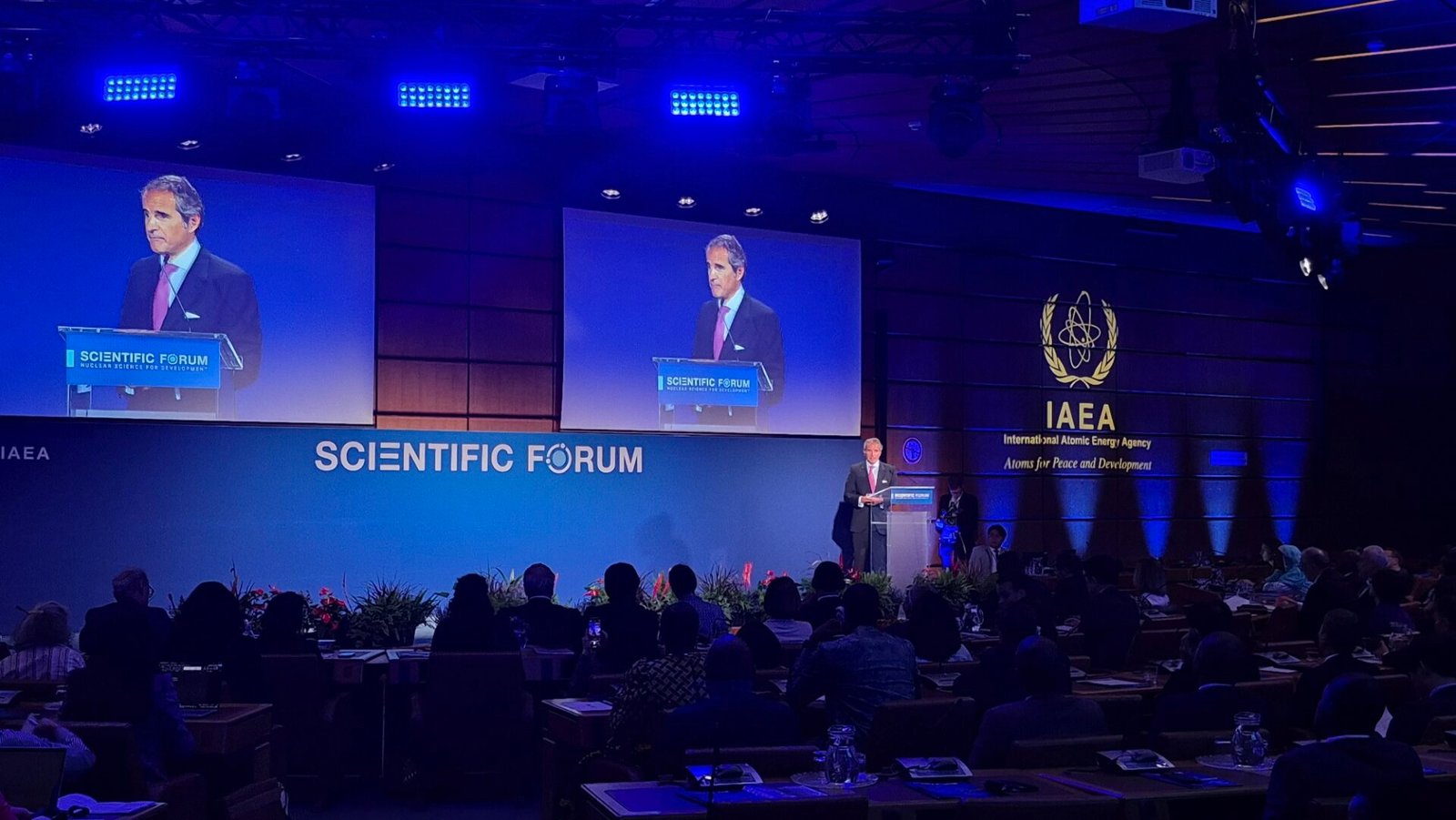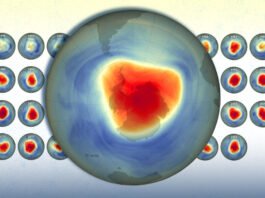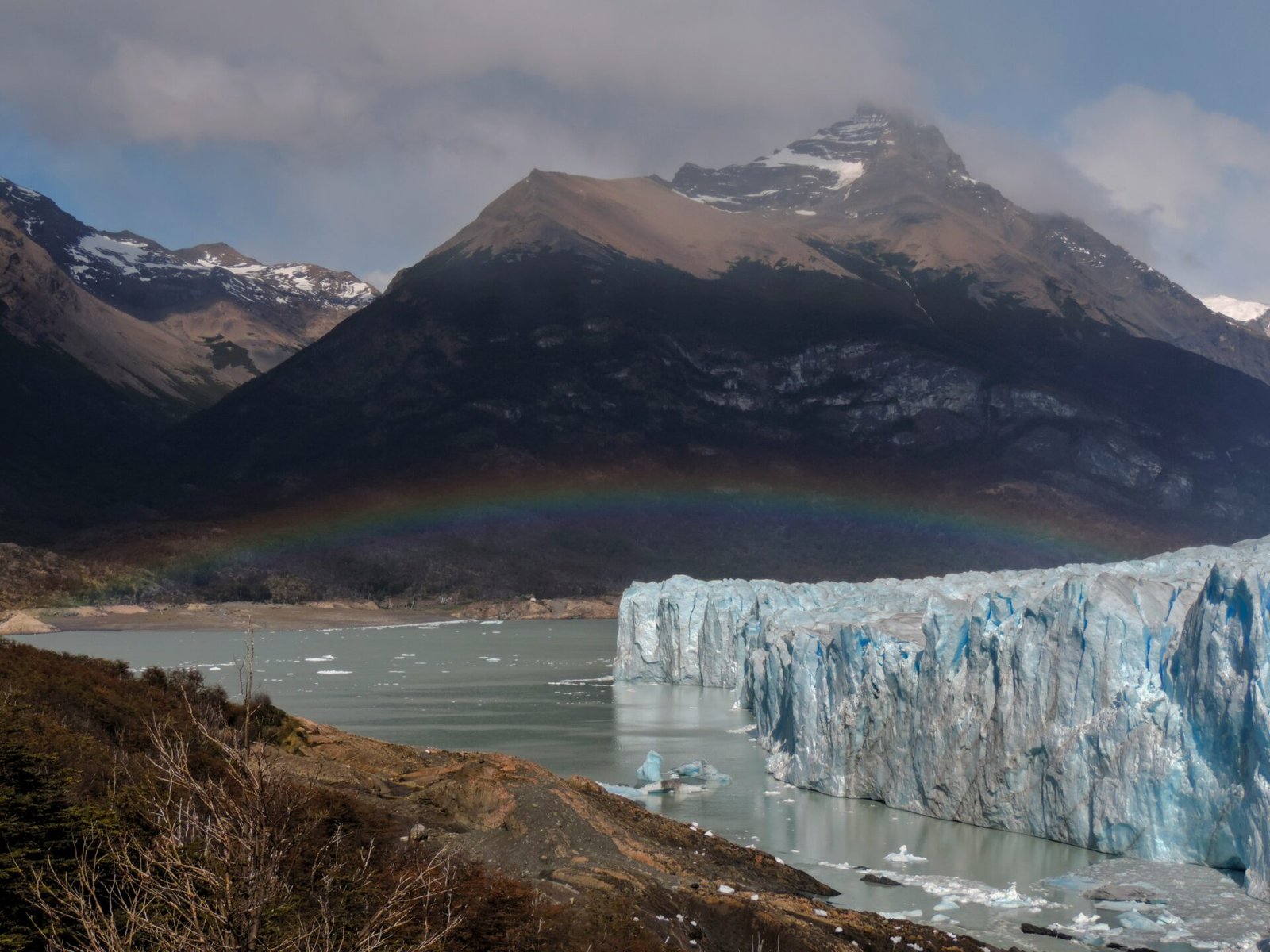Forum Overview
The ‘Atoms for Water’ forum is scheduled to took place from September 16-17, 2025, at the esteemed Vienna International Centre. This pivotal event designed to address some of the most urgent global water challenges we currently face, leveraging the innovative potential of nuclear science and technology. As concerns surrounding water scarcity, quality, and accessibility continue to escalate worldwide, the forum aims to bring together a diverse range of stakeholders, including researchers, policymakers, and industry experts, to collaboratively seek effective solutions.
The primary objective of the ‘Atoms for Water’ forum is to foster dialogue and share findings related to the application of nuclear innovations in water management. Participants will engage in discussions that focus on the role of advanced nuclear technologies in enhancing water purification processes, optimizing water resource management, and increasing the resilience of water systems against climate change impacts. The forum will serve as a platform for showcasing cutting-edge research and practical applications that can directly impact global water policies.
In addition to knowledge sharing, the event will emphasize the importance of cross-sector collaboration. By bringing together professionals from academia, government, and the private sector, the forum seeks to stimulate innovative approaches that can bridge the gap between theory and practice. This collaborative effort is crucial in developing comprehensive strategies that not only address immediate water issues but also offer sustainable long-term solutions.
Overall, the ‘Atoms for Water’ forum is poised to play a significant role in reshaping the conversation around global water challenges. Through its commitment to nuclear science and collaborative innovation, the event aims to inspire actionable strategies that can make a lasting impact on water sustainability worldwide.
Key Global Water Challenges
The world is continuously faced with a multitude of water-related challenges that necessitate urgent attention and innovative solutions. One prominent issue is the impact of climate change, which has led to erratic weather patterns, including severe droughts and heavy rainfall. These fluctuations not only disrupt the water supply but also exacerbate existing vulnerabilities in water management systems. As temperatures rise and precipitation becomes increasingly unpredictable, the availability of freshwater resources is severely threatened, particularly in regions that rely heavily on consistent weather patterns for agriculture and drinking water.
Another critical challenge is the growing pressure on freshwater resources due to increasing population growth. With the global population expected to reach nearly 10 billion by 2050, the demand for clean and safe water will soar. Rapid urbanization, particularly in developing countries, often leads to overexploitation of water sources, resulting in a depletion of groundwater and surface water reserves. This escalating demand may surpass the available supply, creating a situation where millions could face water scarcity, highlighting the urgent need for sustainable water management practices and innovative freshwater technologies.
Lastly, pollution and environmental degradation pose significant threats to water quality. Industrial discharges, agricultural runoff, and inadequate wastewater treatment facilities have contaminated many water bodies worldwide. This pollution not only compromises the quality of drinking water but also affects aquatic ecosystems and the livelihoods of communities that depend on these water sources. Reducing pollution and restoring degraded water environments are essential to ensuring sustainable access to clean water for future generations. Addressing these complex challenges requires collaboration across sectors, emphasizing the importance of innovative approaches and partnerships, such as those explored in the Atoms for Water Forum.
Innovative Nuclear Solutions for Water Management
As the world grapples with escalating water scarcity issues, the role of innovative nuclear solutions in water management has garnered significant attention. The Atoms for Water Forum aims to highlight pioneering advancements in nuclear science that address the pressing global water challenges. Among these cutting-edge technologies are nuclear-powered desalination methods, which efficiently convert seawater into potable water, thereby increasing the availability of freshwater resources.
Nuclear-powered desalination harnesses the thermal energy generated by nuclear reactors to drive the desalination process. This method not only improves the efficiency of converting seawater into drinking water but also reduces reliance on fossil fuels, thus minimizing the associated carbon emissions. By utilizing this sustainable approach, countries with limited freshwater supplies can produce high-quality drinking water, essential for their economic and social well-being. Moreover, this technology can operate in remote locations, providing needed water resources to communities that would otherwise struggle to access adequate supplies.
In addition to desalination, isotope hydrology techniques are another focal point of the forum. These methods use isotopes as tracers to understand groundwater systems comprehensively. By analyzing the isotopic composition of water samples, scientists can gain insights into sources of groundwater recharge, the movement of aquifers, and the sustainability of water resources. This information is crucial for effective water management strategies, allowing policymakers to make informed decisions based on reliable data.
Overall, the integration of these innovative nuclear solutions into water management practices represents a promising avenue for addressing global water challenges. The development and implementation of nuclear-powered desalination and isotope hydrology techniques can significantly contribute to sustainable water management efforts, ensuring a secure and resilient water future for communities worldwide.
Event Highlights and Goals
The Atoms for Water Forum serves as a crucial platform for addressing global water challenges, showcasing innovative solutions through the lens of nuclear technology. A key feature of the forum is an exhibit dedicated to the latest advancements in water sustainability. This exhibit includes cutting-edge technologies and methodologies aimed at improving water management, fostering conversations around sustainable practices. Participants are encouraged to engage with these innovations, underscoring the potential role of nuclear science in securing water resources effectively.
Another significant highlight is the International Atomic Energy Agency’s (IAEA) bottled water project, which focuses on testing water quality. This initiative aims to provide a reliable framework for assessing the safety and sustainability of drinking water in various contexts, emphasizing the importance of quality in global water supply discussions. Through this project, the forum aspires to lend credibility to nuclear techniques in the realm of water safety, showing their relevance in ensuring public health.
The forum also features the unique exhibit titled ‘Water: Reflections of the Next Generation,’ which showcases children’s artwork. This initiative is designed to promote awareness among younger generations about pressing water issues while encouraging creativity and expression. By incorporating children’s perspectives, the forum seeks to create a more inclusive dialogue concerning water sustainability that encompasses all ages.
Overall, the goals of the Atoms for Water Forum include fostering international partnerships and developing practical strategies to ensure a sustainable supply of clean water. The integration of nuclear science into water management practices stands as a primary focus, as stakeholders collaborate to craft actionable solutions that address both current and future water challenges globally. By merging knowledge, technology, and community engagement, the forum emphasizes the vital role of nuclear innovations in tackling these pressing issues.
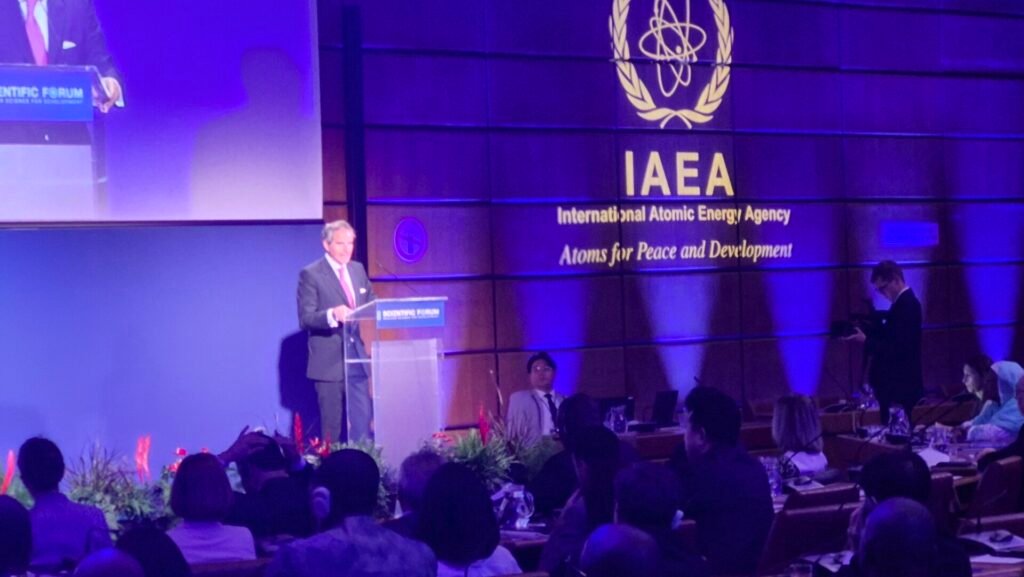
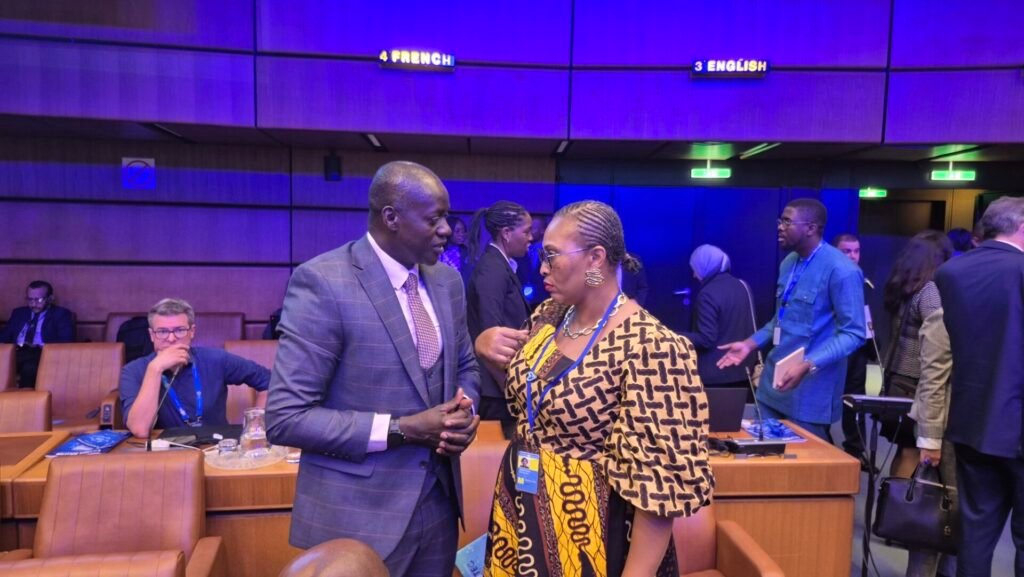
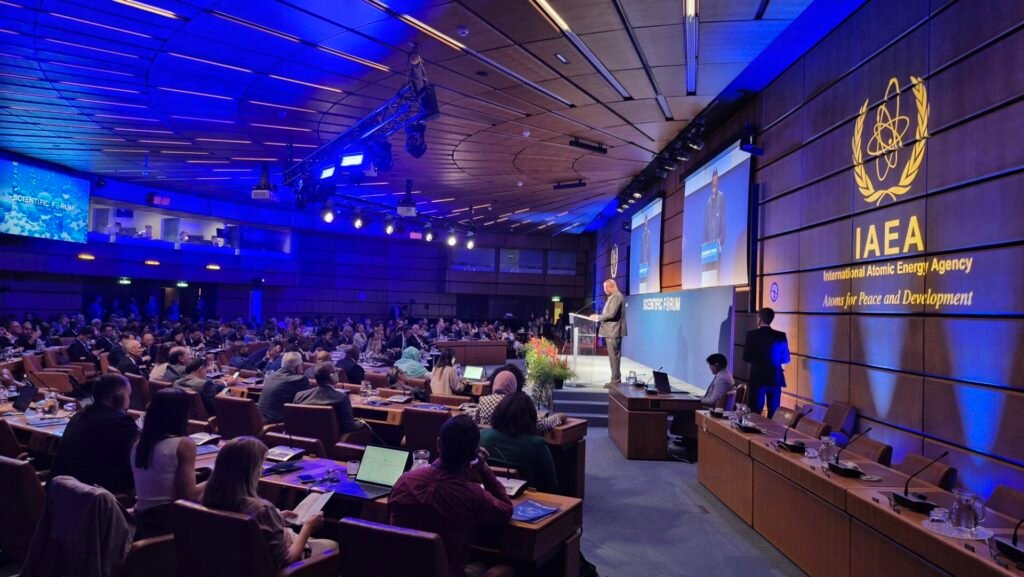
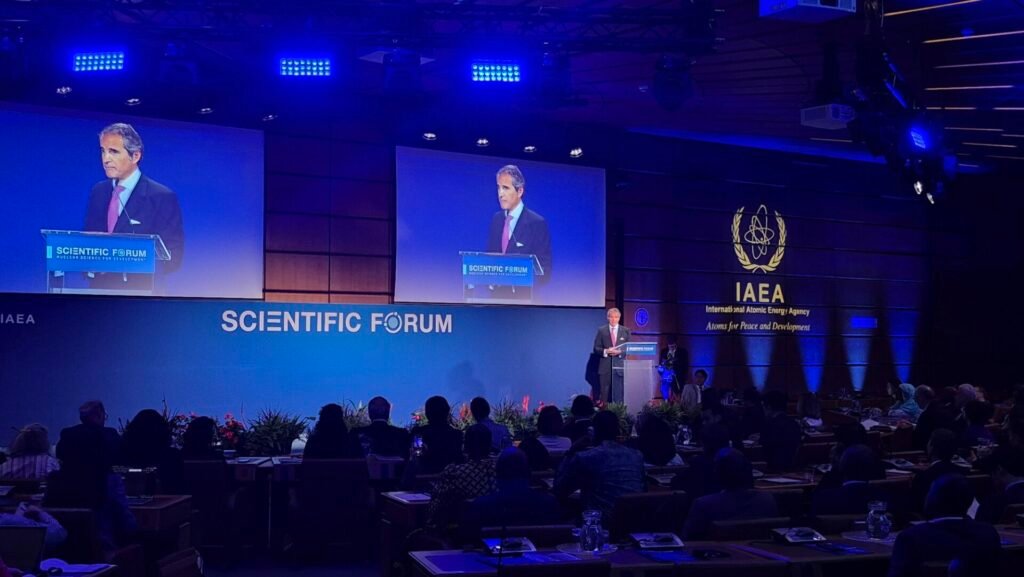
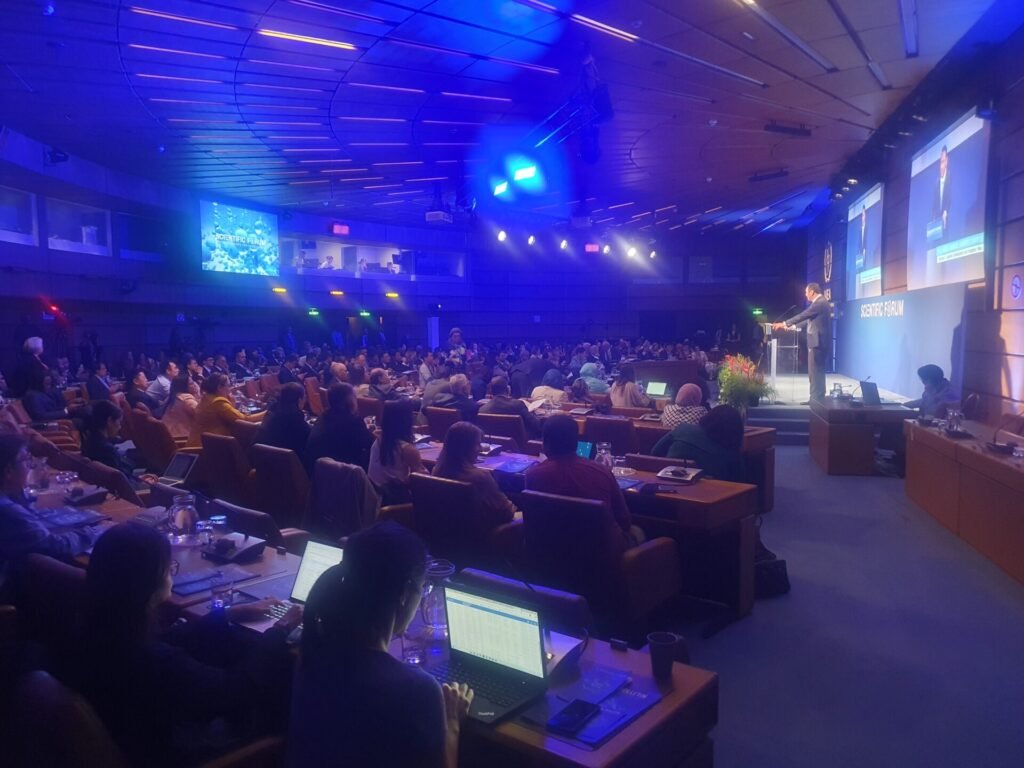
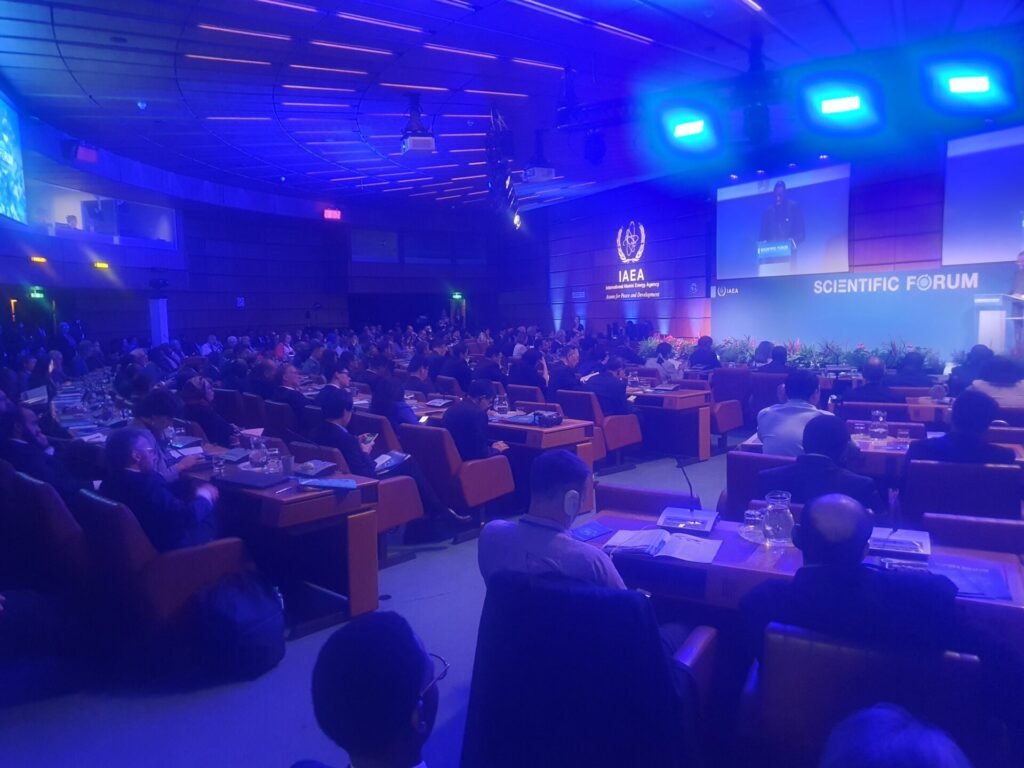
PROGRAMME
TUESDAY, 16 SEPTEMBER 2025
9:30-11:00 Opening Session
IAEA Director General Rafael Mariano Grossi will open the Scientific Forum 2025 with high-level speakers. They will explore how nuclear science and technology innovations can support effective and sustainable management of the world’s water systems.
H.E. Mr Maizama Abdoulaye, Minister of Environment, Hydraulics and Sanitation, Niger
H.E. Mr Ángel Manuel Manero Campos, Minister of Agrarian Development and Irrigation, Peru
Mr Shan Zhongde, Chairman, China Atomic Energy Authority
Ms Anne-Isabelle Étienvre, Chairman, French Alternative Energies and Atomic Energy Commission
Ms Celeste Saulo, Secretary-General, World Meteorological Organization
Mr Gonzalo Alfonso Gutiérrez Reinel, Secretary General, Andean Community
11:00-11:15 Break
11:15-12:30 Session 1: Strengthening Water Resilience and Global Sustainability
This session will explore five key accelerators — data and information, capacity development, governance, financing, and innovation — for advancing global water sustainability, while highlighting the role of nuclear sciences and technologies.
Ms Karina Meredith, Director, Environmental Research and Technology, Australian Nuclear Science and Technology Organisation (ANSTO)
Mr Ricardo Sanchez-Murillo, Former Coordinator of the Stable Isotopes Research Group, National University of Costa Rica
Mr Khalid Khasawneh, Commissioner for Nuclear Power Reactors, Jordan Atomic Energy Commission
Mr Eddy Moors, Rector, IHE Delft Institute for Water Education, Kingdom of the Netherlands
Mr Jay Famiglietti, Global Futures Professor, Arizona State University, United States of America
Mr Winston Yu, Water Practice Manager, World Bank
Mr Amgad Elmahdi, Director of MENA Region, Green Climate Fund
12:30-13:30 Lunch break
13:30-15:00 Session 2: Quality Unknown — the Invisible Water Crisis
This session will address the accelerating global decline of water quality and will explore how nuclear and radiation based technologies can help track, reduce and treat pollutants such as microplastics and pathogens.
Ms Asunción Romanelli, Professor, Institute for Marine and Coastal Research, Argentina
Ms Sueli Borrely, Radiation Applications, Nuclear and Energy Research Institute, Brazil
Mr Gilbert Nijimbere, Lecturer, University of Burundi
Mr Martin Elsner, Full Professor of Analytical Chemistry and Water Chemistry, Technical University of Munich, Germany
Ms Viviana Re, Associate Professor, Department of Earth Sciences, University of Pisa, Italy
Ms Yurina Sekine, Principal Researcher, Japan Atomic Energy Agency
Mr Bum Soo Han, Chief Consultant, Bright Future Technologies Inc., Republic of Korea
Mr Christian Stamm, Deputy Director, Swiss Federal Institute of Aquatic Science and Technology
15:00-15:30 Break
15:30-17:00 Session 3: Climate and Hydrological Variability
This session will examine how climate variability exerts significant pressure on global water systems, increasing the frequency of extreme weather events, and will highlight the role of the IAEA’s data networks in assessing these changes and guiding actions to sustain and optimize water resources.
H.E. Mr Mohamed Nasr, Permanent Representative of Egypt to the International Organizations in Vienna
Mr David Farrell, Principal, The Caribbean Institute for Meteorology and Hydrology, Barbados
Ms Tricia Stadnyk, Professor and Canada Research Chair, University of Calgary, Canada
Ms Jana Ólavsdóttir, Geologist, Faroese Geological Survey, Denmark
Mr Robert Vautard, Senior Scientist, French National Centre for Scientific Research
Mr Kiattipong Kamdee, Nuclear Scientist, Thailand Institute of Nuclear Technology
Mr Chris Soulsby, Professor of Hydrology, University of Aberdeen, Scotland, United Kingdom
Ms Birgit Vogel, Executive Secretary, International Commission for the Protection of the Danube River
WEDNESDAY, 17 SEPTEMBER 2025
09:30-11:00 Session 4: The Role of the IAEA
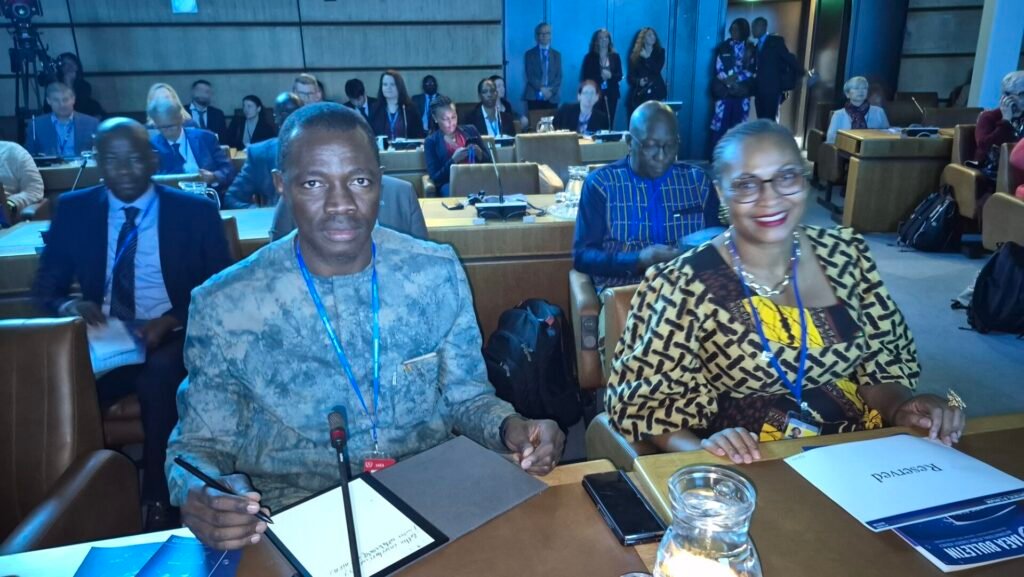
By building capacity, facilitating international cooperation and delivering technical expertise, the IAEA helps Member States address growing water challenges. This session will reflect on how the IAEA helps Member States manage and protect water resources through initiatives such as Nuclear Technology for Controlling Plastic Pollution (NUTEC Plastics) and the Global Water Analysis Laboratory (GlowAL) Network, as well as coordinated research projects and technical cooperation.
Ms Vannesa Vera Agramont, Geographical Engineer, Bolivian Nuclear Energy Agency
Mr Moncef Benmansour, Director of Studies and Scientific Research, National Centre for Energy, Sciences and Nuclear Techniques, Morocco
Ms Saira Butt, Deputy Chief Scientist, Pakistan Institute of Nuclear Science and Technology
Mr Charles Darwin Racadio, Senior Science Research Specialist, Philippine Nuclear Research Institute
Mr Stepan Kalmykov, Vice-President, Russian Academy of Science
Ms Najiba Chkir, Dean Faculty of Sciences, University of Sfax, Tunisia
Ms Christine Mukwaya, Head of the Groundwater Monitoring and Assessment Section, Ministry of Water and Environment, Uganda
Ms Jodie Miller, Section Head, Isotope Hydrology Section, IAEA
11:00-11:30 Break
11:30-13:00 Closing Session: Partnerships and Resource Mobilization
The closing session will feature a high-level panel summarizing findings and discussing steps to maximize nuclear and radiological techniques in water management, including strategies for partnerships and resource mobilization. It will address global water crises, their impact and the IAEA’s role in tackling these issues, emphasizing the importance of nuclear innovation and sustainable financing to support these interventions.
Mr Mohamed CBC Diatta, Senegal’s Sherpa for 2026 UN Water Conference, Ministry of Water and Sanitation Senegal
Ms Tatiana Molcean, UN Under-Secretary-General and Executive Secretary, UN Economic Commission for Europe
Ms María Jimena Durán, Senior Executive for Global Partnerships, Development Bank of Latin America and the Caribbean (CAF)
Ms Lina Escobar-Rangel, Senior Energy Specialist, Interamerican Development Bank

